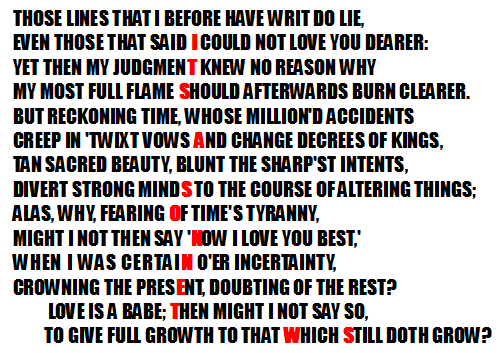ruelle
n. the space between a bed and the wall
Language
“Come Wade, Dear Maid”
Cynthia Knight published this dialogue in the Journal of Recreational Linguistics in 1984 — apart from the italicized words, it’s composed entirely from two-letter state postal abbreviations:
Characters:
MS. INGA LANE, paid cook
NEAL DEMSKY, lame vandal
PA (akin), many-decade lama
Places:
Arid moor
Arcade game near Marineland
Concorde de la Mode
Season:
Pascal
Props:
Pail, cane, alpaca
NEAL: Decoct, maid! Almond wine! Deal?
INGA (in coma): Ma! Papa! Come near me! Alms!
NEAL (florid): Mine meal! Moil, Inga!
INGA (in pain): Demand in vain!
NEAL aria, or pavane
NEAL lams
INGA (in code): Deny; hide mail; scar me! Oh, inky condor, come! Oh, mend me!
PA came
PA: Hi, Inga. Come ride; wide lane? Mom’s game.
INGA (wail): Candor, OK? Pact?
(“Who can finish this absorbing story?”)
In a Word
minimifidian
n. a person who has the least possible faith in something
In a Word
adaemonist
n. one who denies the existence of the devil
devilshine
n. demonic power or skill
Ronald Knox wrote, “It is stupid of modern civilization to have given up believing in the devil, when he is the only explanation of it.”
In a Word
epeolatry
n. the worship of words
A selection of adjectives, from Laurence Urdang’s Modifiers (1982):
abbatial, of an abbot
buccinal, of trumpets
cervine, of deer
compital, of a crossroads
contabescent, of atrophy
culicid, of mosquitoes
frumentaceous, of wheat
haruspical, of a soothsayer
macropodine, of kangaroos
natant, of swimming
obumbrant, of an overhang
orarian, of the seashore
pavonine, of peacocks
smaragdine, of emeralds
sphingine, of a sphinx
suspirious, of a sigh
trochilidine, of hummingbirds
tussal, of a cough
veliferous, of sails
“The word good has many meanings,” wrote Chesterton. “For example, if a man were to shoot his grandmother at a range of five hundred yards, I should call him a good shot, but not necessarily a good man.”
Hint
Discovered by Mike Keith — Shakespeare’s 115th sonnet contains a message from the author:

Repeat Performance
The index of the 57th edition of the Handbook of Chemistry and Physics includes the entry Sea water, see Water, sea.
The Latin phrase Malo malo malo malo can be translated as “I would rather be in an apple tree than a bad boy in adversity.”
Betty and Jock Leslie-Melville’s 1973 book Elephant Have Right of Way cites the Swahili sentence Wale wa Liwali wale wale (“the people of the Arab chieftain eat cooked rice”). “How is it pronounced? Just say ‘Wally’ five times.”
And in Finnish the utterance “Kokko, gather up the whole bonfire. The whole bonfire? The whole bonfire, Kokko, gather up!” is rendered as Kokko, kokoa koko kokko kokoon. Koko kokkoko? Koko kokko, Kokko, kokoa kokoon!
(Thanks, Jani.)
In a Word
periscii
n. the inhabitants of the polar circles: so called because in summer their shadows revolve around them
antiscians
n. people who live on the same meridian but on opposite sides of the equator, so that their shadows at noon fall in opposite directions
perioeci
n. people who live at the same latitude but on opposite meridians, so that noon for one is midnight for the other
In a Word
burgh-bote
n. a tax for the repair of fortresses
Orthography
“It’s a damn poor mind that can only think of one way to spell a word.” — Andrew Jackson
“If the professors of English will complain to me that the students who come to the universities, after all those years of study, still cannot spell ‘friend,’ I say to them that something’s the matter with the way you spell friend.” — Richard Feynman
A gentleman received a letter, in which were these words: Not finding Brown at hom, I delivered your meseg to his yf. The gentleman, finding it bad spelling, and therefore not very intelligible, called his lady to help him read it. Between them they picked out the meaning of all but the yf, which they could not understand. The lady proposed calling her chambermaid, ‘because Betty,’ says she, ‘has the best knack at reading bad spelling of any one I know.’ Betty came, and was surprised that neither sir nor madam could tell what yf was. ‘Why,’ says she, ‘yf spells wife; what else can it spell?’ And, indeed, it is a much better, as well as shorter method of spelling wife, than doubleyou, i, ef, e, which in reality spell doubleyifey.
— Benjamin Franklin, letter to his sister, July 4, 1786
